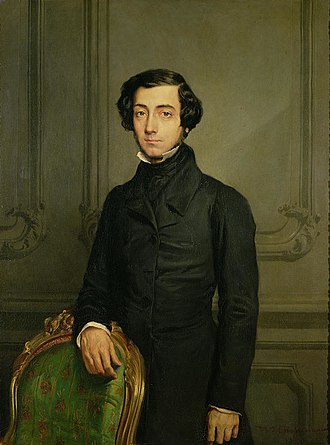
Tocqueville was active in French politics, first under the July Monarchy (1830–1848) and then during the Second Republic (1849–1851) which succeeded the February 1848 Revolution. He retired from political life after Louis Napoléon Bonaparte's 2 December 1851 coup and thereafter began work on The Old Regime and the Revolution. Tocqueville argued the importance of the French Revolution was to continue the process of modernizing and centralizing the French state which had begun under King Louis XIV. The failure of the Revolution came from the inexperience of the deputies who were too wedded to abstract Enlightenment ideals.
Tocqueville was a classical liberal who advocated parliamentary government and was skeptical of the extremes of democracy. During his time in parliament, he sat on the centre-left, but the complex and restless nature of his liberalism has led to contrasting interpretations and admirers across the political spectrum. Regarding his political position, Tocqueville wrote "the word 'left' is [. . .] the word I wanted to attach to my name so that it would remain attached to it forever".
In 1831, Tocqueville obtained from the July Monarchy a mission to examine prisons and penitentiaries in the United States and proceeded there with his lifelong friend Gustave de Beaumont. While he did visit some prisons, Tocqueville traveled widely in the United States and took extensive notes about his observations and reflections.He returned within nine months and published a report, but the real result of his tour was De la démocratie en Amérique, which appeared in 1835. Beaumont also wrote an account of their travels in Jacksonian America: Marie or Slavery in the United States (1835).
In Democracy in America I, published in 1835, Tocqueville wrote of the New World and its burgeoning democratic order. Observing from the perspective of a detached social scientist, Tocqueville wrote of his travels through the United States in the early 19th century when the Market Revolution, Western expansion and Jacksonian democracy were radically transforming the fabric of American life.
As emphasized in Introduction to Book I, the purpose of the work is somewhat beyond the American democracy itself, which was rather an illustration to the philosophical claim that democracy is an effect of industrialization. In a sense, Tocqueville anticipated Marx’s viewpoint that history is determined by development and changes of socio-economic conditions — the so-called formations that are described by specific productive forces and relations of production. This focus on the philosophy of history justifies a certain ambiguity in using the word 'democracy' and explains why Tocqueville even ignores the intents of the Founding Fathers of the United States regarding the American political system.
Tocqueville was an ardent supporter of liberty. "I have a passionate love for liberty, law, and respect for rights", he wrote. "I am neither of the revolutionary party nor of the conservative. [. . .] Liberty is my foremost passion". He wrote of "Political Consequences of the Social State of the Anglo-Americans" by saying: "But one also finds in the human heart a depraved taste for equality, which impels the weak to want to bring the strong down to their level, and which reduces men to preferring equality in servitude to inequality in freedom".
His view on government reflects his belief in liberty and the need for individuals to be able to act freely while respecting others' rights. Of centralized government, he wrote that it "excels in preventing, not doing".
Tocqueville continues to comment on equality by saying: "Furthermore, when citizens are all almost equal, it becomes difficult for them to defend their independence against the aggressions of power. As none of them is strong enough to fight alone with advantage, the only guarantee of liberty is for everyone to combine forces. But such a combination is not always in evidence".
 RSS Feed
RSS Feed